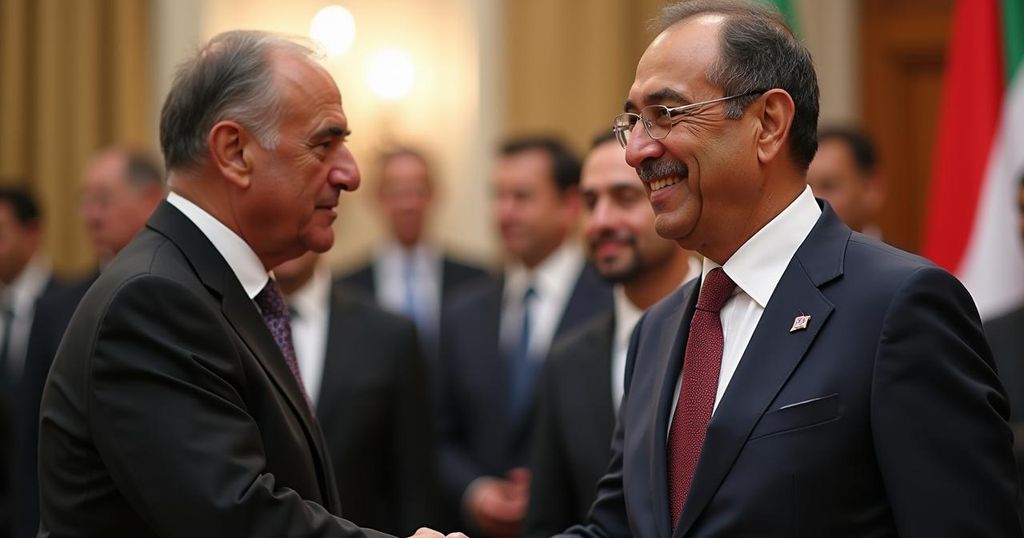Evolving Alliances: Egyptian President al-Sisi’s Visit to Eritrea amidst Regional Tensions

Egyptian President Abdul Fattah al-Sisi’s visit to Eritrea highlights the formation of a tripartite military alliance with Eritrea and Somalia amidst rising regional tensions. This new alliance threatens to further isolate Ethiopia, whose relationships with both Eritrea and Somalia have deteriorated. The discussions in Asmara signify a turning point in regional dynamics, particularly concerning ongoing conflicts and the implications of Ethiopia’s Grand Ethiopian Renaissance Dam.
On October 10, 2024, Egyptian President Abdul Fattah al-Sisi arrived in Asmara, Eritrea, following an invitation from President Isaias Afwerki. This visit is significant amid increasing regional tensions, as Egypt, Eritrea, and Somalia seek to establish a tripartite military alliance. Their discussions are anticipated to cover crucial topics such as achieving peace in the Horn of Africa, enhancing security in the Red Sea, and addressing various bilateral and regional matters. The formation of this military alliance arrives at a precarious moment for the Horn of Africa. The previously improving relations between Ethiopia and Eritrea have now suffered a setback, evidenced by the recent suspension of flights and phone connections between the two nations. This alliance may further isolate Ethiopia, especially as its relationship with Somalia has faltered amidst recent diplomatic disputes, which have included Ethiopia’s agreement with Somaliland. Ironically, Ethiopia finds itself isolated despite its historical role as a mediator between Eritrea and Somalia. Prime Minister Abiy Ahmed had played a crucial role in ending a lengthy conflict with Eritrea—a feat that contributed to his Nobel Peace Prize in 2019. However, tensions have escalated, with Ethiopia accusing Somalia of inciting instability in collaboration with foreign forces, including military support from Egypt to Somalia. Additionally, the nearing completion of the Grand Ethiopian Renaissance Dam (GERD) adds further complexity to the regional dynamics. Egypt has consistently opposed this project, fearing it will diminish its share of the Nile River’s resources, whereas Ethiopia views the dam as vital for its economic prosperity. Egypt’s increasing military ties with Somalia and Eritrea only exacerbate the existing tensions surrounding the GERD. Notably, Prime Minister Abiy Ahmed and Somali President Hassan Sheikh Mahmoud are currently engaged in bilateral talks in Asmara with President Afwerki. Their discussions aim to navigate the numerous regional tensions and conflicts that have strained their previous relationships. As Egypt fortifies its alliances with Eritrea and Somalia, Ethiopia’s position appears to be steadily weakening. The cessation of communications and flights with Eritrea emphasizes the delicate state of their relations, casting doubt on Addis Ababa’s potential role in future regional peacekeeping. While President al-Sisi, President Afwerki, and President Mahmoud engage in dialogue, Ethiopia’s involvement in shaping the Horn of Africa’s future remains in jeopardy, as new geopolitical realities threaten to alter traditional power dynamics within the region.
The Horn of Africa has long been a focal point of complexity in East African geopolitics, influenced by a history of enmity and alliance among its nations. Ethiopia, Eritrea, and Somalia have transitioned through phases of conflict and collaboration shaped by various internal and external factors. The shift towards a tripartite military alliance among Egypt, Eritrea, and Somalia indicates a crucial pivot in regional alliances, driven by ongoing geopolitical tensions—including the unresolved issues surrounding the Grand Ethiopian Renaissance Dam. The region has recently witnessed a decline in previously successful diplomatic relations, especially between Ethiopia and Eritrea, stressing the need for introspection regarding long-standing collaborations and rivalries. Furthermore, developments such as Ethiopia’s increasing isolation amidst changing alliances signal potential shifts in the dynamics of power in the Horn of Africa.
In summary, President al-Sisi’s visit to Eritrea underscores a significant strategic move amid rising tensions in the Horn of Africa. The proposed tripartite military alliance among Egypt, Eritrea, and Somalia has the potential to reshape the regional political landscape, particularly concerning Ethiopia, which is increasingly marginalized. With historical alliances giving way to new dynamics catalyzed by factors such as the GERD and military partnerships, the challenges will require careful diplomacy. As Ethiopian leaders engage in talks in Asmara, their path forward remains uncertain, illustrating the precarious balance of power that currently exists.
Original Source: addisinsight.net







